How marketers can take advantage of the latest Facebook update
The dust has now settled following Facebook’s announcement of a change in their algorithm to ensure users see more content from friends and family and less from brands and pages. In a bid to boost the number of meaningful interactions people have with Facebook, the change has led to fears of a further slump in visibility for some business pages but also optimism from influencers and brands with a dedication to high quality content.
Download our Premium Resource – Smarter Facebook Marketing Strategy Guide
This guide will allow you to create a plan for managing Facebook communications in your company or for your clients. It will help you grow your following and use Facebook more cost-effectively.
Access the
’Content shock’ is still a challenge for marketers
For many brands the new algorithm change will not be a huge surprise and for the largest advertisers it’s unlikely to affect their current operating model (paid ads should see little or no impact as Facebook’s ads auction already optimises for user value). Nevertheless I see this change as another example of the continuation of ‘content shock’, a term coined by Mark Schaefer in 2014 to explain the consequences of ever increasing amounts of (poor) quality content on consumers’ attention and appetite for information:
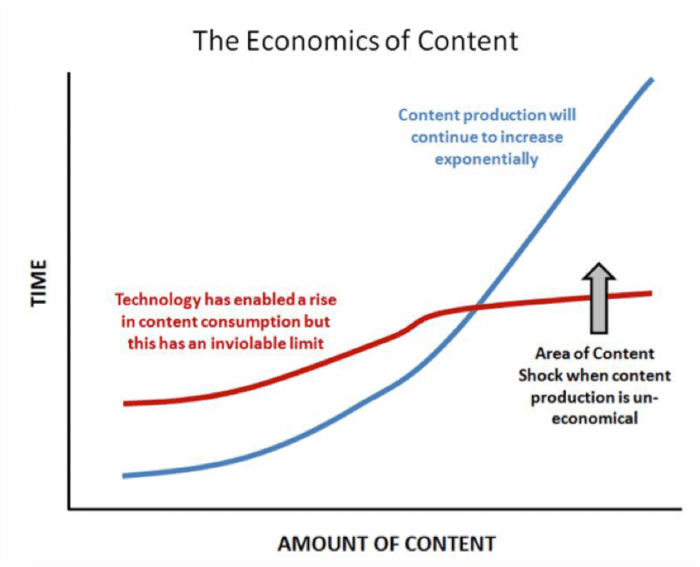
Source: business2community
The reality is that for many years marketers have not been investing in building a truly genuine social presence by establishing an engaged, interested audience on social channels. Instead there has tended to be more emphasis on generating short-term results by ‘chasing the algorithm,’ for example through shock headlines and ‘engagement-baiting’:
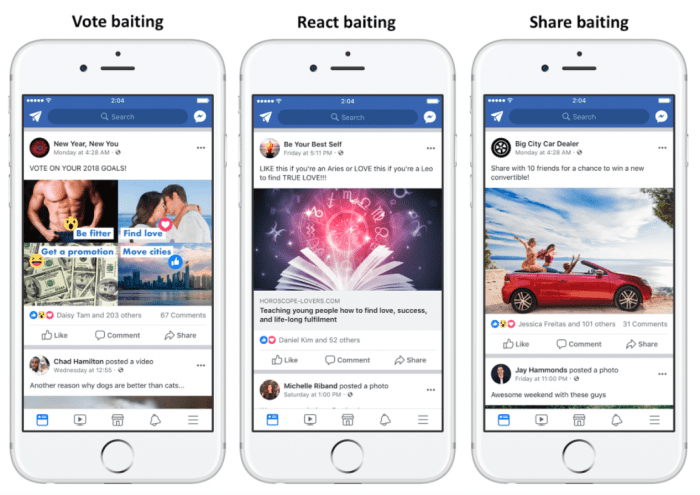
The latest algorithm change means that brands without substantial advertising budgets will have to work harder than ever to achieve cut-through organically in the News Feed, something that has already been a struggle with the ongoing decline in organic reach:
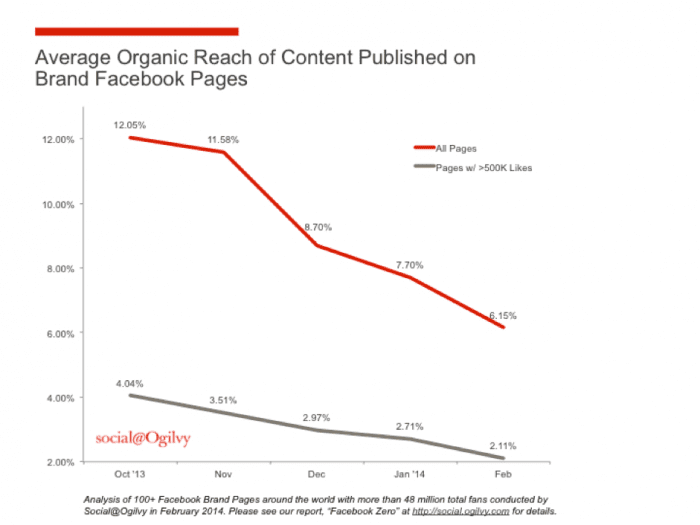
The latest algorithm change means that the days of organic reach for most brands really is over and that paid advertising opportunities will also decline as more marketers look to buy ads to reach their audiences, thus pushing prices higher.
Nevertheless, overall I see Facebook’s algorithm change as a big opportunity for marketers who are genuinely interested in producing great content to build their brands online. Paid media can sometimes lull us into a false sense of security as to what ‘good’ looks like by taking a shortcut into consumers’ News Feeds. Perhaps now it will once again encourage all of us to re-evaluate what content we produce and how this is distributed.
So here are a few thoughts on the implications of Facebook’s latest algorithm change and how digital marketers can respond:
1. Don’t rely on third-party platforms to build your brand online
It’s been a given for many years that you own nothing on social media. Social media ≠ owned media and therefore any brand following a strategy to build a presence on Facebook, Twitter, Instagram etc. should proceed with caution. Platforms like Facebook will change the rules of the game and it will always be to benefit them and no one else.
This doesn’t mean that social media should not form a key part of your approach to digital marketing - it will always be important to show up where your customers are present and build awareness and engagement. However what this does mean is that marketers should evaluate their paid/ owned/ earned media model and the balance across channels:
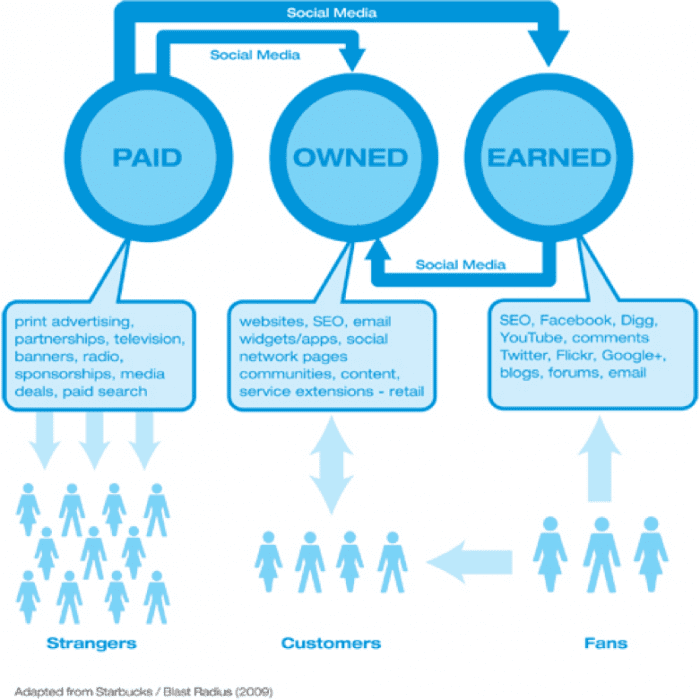
Your website, blog, podcast and email are places where you truly own and control the content and user experience, and even more importantly where you can begin to gather valuable data. As Chris Penn explains:
“We receive data. Analytics. Insights. We see what’s working, not in terms of likes or shares, but in terms of conversions and business impact we care about. We have far more tracking ability, far more data made available to us when we’re using our owned media than when we rely completely on a third party service”.
2. Continue to follow content best practice
Facebook’s algorithm change only further emphasises the importance of creating content that stands out and resonates with your audience. Anything that falls short of ‘excellent’ is unlikely to feature in the News Feed and therefore a waste of time and effort.
Two years ago I highlighted the concept of ‘10x content’, defined by Inbound.org as:
“Content that has gravitas, is enduring and worth paying attention to”
Whilst the post from January 2016 was geared more around search, the criteria for 10x content feels right for what Facebook is expecting from brands:
- Entertaining/ moving/ thought provoking
- Provides genuine utility
- Educational
- Absorbing/ immersive
- Visually stunning
- Includes in-depth research
- Designed and produced for the right web experience (mobile, desktop, tablet, browser)
- Includes optimised data visualisation/ infographics
Some steps to creating 10x content include:
Solve problems
The goal should be to help and provide something of value for the user. This will help build affinity and is far more likely to generate meaningful conversation and engagement.
Stop producing standard quality content
Standard, ‘1x content’ content is a waste of time. Unless you’re providing real value by being genuinely unique, outstanding or engaging, you’re unlikely to get noticed within the News Feed.
Build relationships
Look to build relationships. Share great content by others that’s relevant to your industry, co-operate with other thought-leaders and influencers and engage with customers and prospects across your different social and online platforms. This type of activity will help foster ties with other content creators, leading to better reputation and visibility:
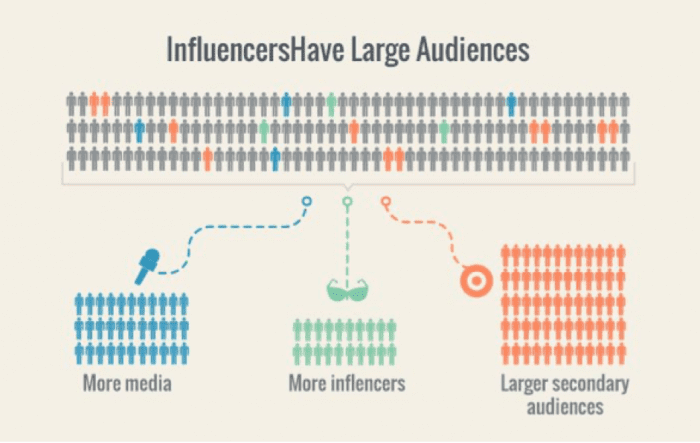
Source: Moz
3. Use paid media to generate real reach and cut-through
The algorithm change is unlikely to affect paid ads in any meaningful way. Facebook has explained that their systems will continue to take into account relevancy and feedback to deliver ads to the right people based on a brand’s business objectives but they are are not making any changes to ads ranking at this time.
However, if a page post is getting less organic reach due to this ranking change, it may see a slight impact in the ads auction, if boosted. However it’s important to note that engagement is a very small part of the ads ranking as Facebook rely on many other data points to determine what ads people see to ensure relevancy and value.
Paid media is therefore the only way to guarantee a presence within the New Feed and those that follow the right creative best practices are likely to generate the best results:
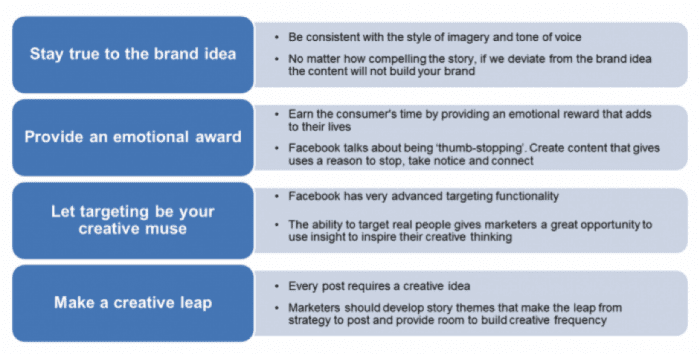
With the right approach to creative, targeting and measurement, brands will still be able to reach their target audience and build their brand on Facebook. However I believe the days when brands can push out poor quality paid content are also numbered and for good reason - consumers deserve better and better content can only be good for everyone.












